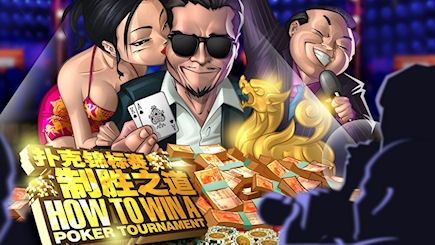This article first appeared in the Mar/Apr 2013 issue of World Gaming magazine.
Winning a poker tournament is not an easy thing to do. World Gaming’s own James “Welcome Back” Potter unlocks some of the secrets on how to become a better tournament player and one day win a poker tournament of your own.
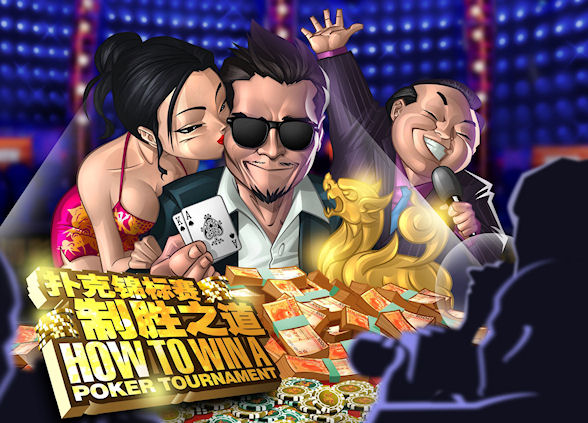
Poker Tournaments 101
I have played, reported, written about and taught poker now for well over a decade. I am a tournament player, and when I’m on song I really know how to play. For the most part there is a right way and a wrong way to play a tournament. But when you get to a certain level of proficiency, most decisions become debatable, and the game then becomes a question of style, not of right and wrong.
Having said that, most players have yet to reach this level of proficiency, and it may take you years to get there. The best players in the world understand that poker is a lifelong mountain climb and you never reach the top. You don’t perfect poker, you simply keep learning from it. Poker is a contradiction. The essence of what it takes to be a great poker player makes it nearly impossible to be a great poker player. It takes a unique combination of courage, intelligence, skill, gamble and discipline – traits that most of us (including myself, I might add) don’t always bring to the poker table. And to win a poker tournament you need the cherry on top – that impossible-to-predict series of events some call “luck” – the fall of the cards going your way at the right time.
Poker is … a fascinating, wonderful, intricate adventure on the high seas of human nature. – David A Daniel
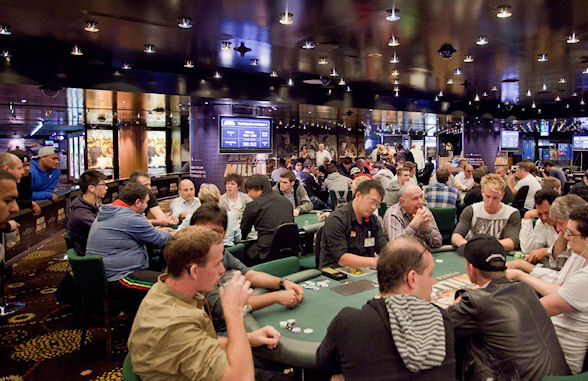
To me, the game of poker is analogous to golf, which in my opinion is the closest sport to a poker tournament. You can go and buy the best set of golf clubs and stand on the first tee of the most expensive country club and you will probably not hit the ball very far. If you allow yourself to be taught, you will improve quickly. Everyone has the ability to improve and the more you practice, the better you will become. You will then hit a point where progress slows, which is only natural. After all, no matter how many golf balls you hit, you will never hit them like Tiger Woods.
Poker is a lot like sex, everyone thinks they are the best, but most don’t have a clue what they are doing! – Dutch Boyd
For some strange reason nearly all poker players think they can be champions. At my best I was an excellent player, but there were a handful of players I felt honored to play against, and who left me shaking my head in bewilderment at their ability.
What I hope to achieve here is to give you a guide to the different stages of a poker tournament, and what you should be thinking about at each stage. Follow this basic outline and practice the skills and you will improve. If you play enough of them, you will one day win a poker tournament. I found winning poker tournaments among the most satisfying experiences I have ever enjoyed.
Early Stages
The early stages of a poker tournament are in some ways the hardest, and in other ways the easiest. The one thing that is true about this stage is that everyone gets plenty of practice. And what’s even more compelling is that at the start of the tournament, the kid playing his first ever event enters the contest at the same level as the multiple-times world champion.
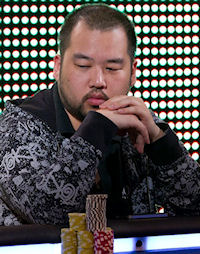
2012 Aussie Millions Main Event runner-up Ken Wong
The next thing to do is to learn your table. Find out the breaking order of the tables and if your table has a long time to wait before it breaks, prepare yourself to battle it out with the players around you for a long period of time. You need to form opinions of everyone sitting at your table by studying them like a hawk. This is going to take a little bit of time, but you should make yourself acutely aware of your surroundings. Also, make yourself feel comfortable. Drink some water, maybe listen to some relaxing tunes on your phone and settle in for a long day.
After the first twenty minutes, if you don’t know who the sucker at the table is, it’s you. – Famous poker proverb
|
Some things to remember
|
|
|---|---|
Never … lose your temper, either with those you are playing with or, more particularly, with the cards. There is no sympathy in poker. Always keep cool. If you lose your head you will lose all your chips. – William J. Florence |
Mel Judah, an Australian pioneer of the game, once told me he wouldn’t put all of his chips into the middle pre-flop on the first hand of any tournament. The point he was making was that a tournament is a long process that can’t be won in the early stages. Phil Hellmuth is another who has often been quoted on the virtues of being cautious during the early stages. His 13 WSOP bracelets certainly bear testament to this view. In a deep stack tournament or a main event that will last a long period of time, you have a little more grace and a few more chips to play with, but I am always mindful of not risking running headlong into a train wreck before it’s absolutely necessary.

Phil Ivey
My advice here is to find what works for you. Some very good players play very aggressively early, where others play more conservatively. I believe there are opportune times to be aggressive later in a tournament, so prefer to bide my time and settle into the battle before I try to win the war.
You get your chips your way. I’ll get my chips mine. – Phil Ivey
Middle Stages
The middle stages are where the poker tournament takes shape and players continue to make mistakes. A very important thing to recognize here is something called “relative chip position”, which refers to how strong your stack is relative to the average chip stack of the tournament, and more importantly, the chip stacks at your table. If you want to be successful then stack size, and therefore relative chip position, is one thing that should alter your playing style, and the playing styles of your better opponents. Very bad players will play every hand the same way regardless of stack sizes, so don’t over-analyze their game. You just need to treat them with patience. Their chips will be gifted away at some stage.
|
My top five tournament poker players
|
|
|---|---|
Erick Lindgren thought it would be a good idea to issue a challenge saying he and I could amass more player of the year points than any other two players. (Except for Phil Ivey because he doesn’t count. He’s not human.) – Daniel Negreanu |
The cards you are dealt are obviously going to play a major role in your style of play. People who say it doesn’t matter what they are dealt are living in a dream, so ignore their proclamations. What is important though is the notion of “fold equity”. Fold equity is probably the most important of all tournament principles and describes your ability to force your opponent to fold. If you are low on chips and fighting for your tournament life, it is usually better to pick up the blinds and antes or a small pot than risk your tournament life.
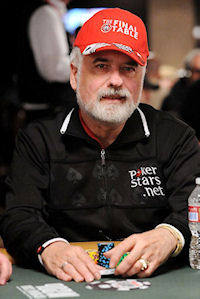
Tom McEvoy
The way you maintain fold equity depends on the size of the chip stacks, and the quality and aggressiveness of the players on your table. I remember once being moved to a table to find myself sandwiched between Grant Levy and another excellent Australian player known as the Peppermint Hippo, both of whom had huge stacks compared to my medium stack. Both these players were playing aggressively and were keen to take me on at any given opportunity. With these factors in play, I had lost my fold equity. I have been on other tables where I nursed a very small stack and maintained my fold equity, especially with weak players to my direct left.
Play your game, build your stack size and be mindful of where you are situated, both in the tournament as a whole and at your table. Look to take advantage of blind and ante increases. A balance between survival and chip accumulation is the secret.
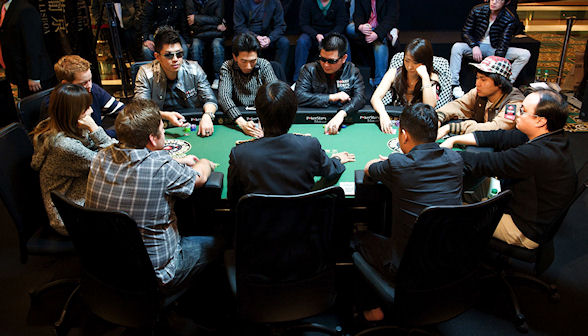
Poker is not a game of cards played by people. It is a game of people played with cards. – Famous poker proverb
Near the Money
As the money draws near, most players play badly. Making the money is great, especially in a large tournament you have been playing for several days. There is only one thing worse than bombing out of a tournament just before the money and that is bombing your chance at winning the tournament through bad play at this stage.
If you have a big stack, be aggressive! Prey on small stacks and apply pressure if at all possible. If you have a medium stack, look to build your stack by applying pressure, all the while being wary of aggressive players with large stacks. They will want to own the table. If you have a small stack, be ready to gamble. You might find your opponents are simply trying to pressure you and not necessarily playing premium hands.
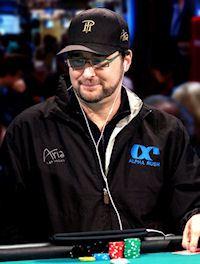
Phil Hellmuth
Poker players don’t become successful overnight. It’s a gradual process of moving from friendly games to high stakes. You need to play to improve, and you need to lose to give yourself the incentive to improve your play. Improving one’s game is definitely trial by fire. – Phil Hellmuth
In the Money
Hooray! You have made the money, and the pressure is now off! Well, if you believe that then you should never sit down at any poker tournament. It may sound stupid but you would be amazed how many new players think that the job is now done. For seasoned pros and quality players, the journey has just begun. You have now been handed the opportunity to show what you are truly made of. Now is the time to stand up!
Short stacks that have limped into the money will become very aggressive now, throwing their chips into the middle with gay abandon trying to claw their way back into the contest. If you have a large stack you can take advantage of this, but do it with care. It’s going to be a lot harder to get players off their hands early on in this stage of the tournament.
Don’t challenge strong players, challenge weak ones. That’s what they’re there for. – John Vorhaus
A large chunk of players will be eliminated very quickly before the tournament turns into a grind, as the last five percent or so of players battle it out for a seat at the final table. As play starts to tighten up you can get back to playing strong, aggressive poker. This is the time you want to pick up hands, be aware of fold equity and hope luck is on your side.
The Final Table
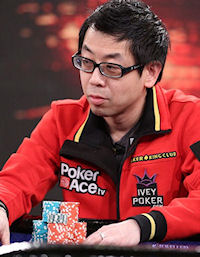
Winfred Yu
If you’re not pissed off for greatness then that means you’re ok with being mediocre. – Ray Lewis, Baltimore Ravens
Madam Poker now gifts you with another set of contradictory tactics. You can make a lot of money by letting other players beat the living hell out of each other, and knock each other out. But if you are too passive you lose your chance of accruing enough chips to fight it out for the title should you reach the final few.
Again you have to find out what works well for you. Practicing by playing some sit-and-go’s will really help you out here. Your style of play will depend on the dynamics of the players, the chip stacks and how quickly the blinds and antes increase. Use your common sense! If play is passive, be more aggressive, and if it’s aggressive, pick your spot and hope your cards hold up.
Short Handed
The final table has thinned to around three to five players. Play takes on a completely different dynamic to a full ring game. Chip stacks are crucial and you must play the situation and the man (or woman) rather than the cards. The pressure is always on the shortest stack at the table – he is the player who is “meant” to be eliminated next.
If you’re not the shortest stack, generally wait for Mr Shorty to be eliminated. If it is you doing the eliminating with your quality hand then so much the better. But if you become the shortest stack, don’t be afraid to gamble it up. You usually have a lot of fold equity when you shove it in the middle, unless your opponent has a monster stack or a monster hand.
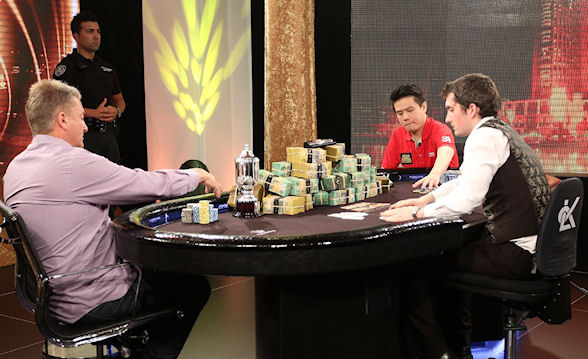
Mervin Chan and Joe Cabret battle it out heads-up for the 2013 Aussie Millions Main Event title. Chan went on to defeat Cabret.
Heads-Up
Some people view heads-up poker as a very pure form of the game. I tend to think it is more about luck than skill. Some players have an incredible heads-up record. I am just slightly in front.
Heads-up poker play may be the purest form of psychological warfare this game has to offer. It’s no wonder why the old westerns and Rounders and every other poker movie always comes down to a one-on-one battle between the good guy and the villain. – David Williams
This stage of the tournament comes down to playing the player and nothing more. Once again if your opponent is ultra-aggressive you need to be more patient, and vice versa. There is a definite power struggle and the title of aggressor switches from player to player. The key here is to be hungry yet controlled. These are two elements that will see you with the best chance of glory.
|
MY BEST ASIAN POKER PLAYER
MUST READ AUTHORS
|
Online
Online poker tournaments can be considered excellent practice for live play, but it does have its own unique skill set. There is huge money to be won and players from all over the world play.
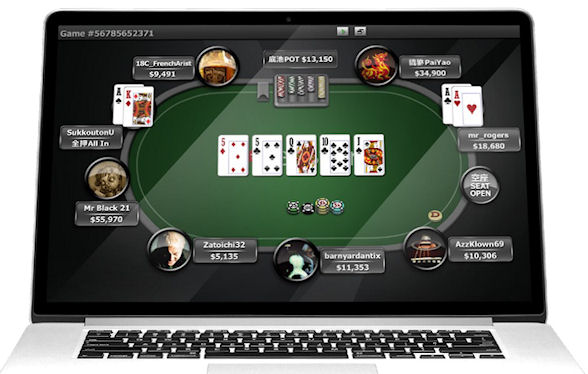
Strategy online differs somewhat from live tournaments. The major disadvantage is that you are playing against faceless opponents. This doesn’t mean you can’t learn about your opponents, but it is far different from the cut and thrust of live tournament poker.
The advantage is that you can play tournaments all day, every day and there is always another tournament about to start. You can also play more than one table which suits the easily-bored, next generation of players. Because you don’t have to rely on someone to deal the cards, you get many more hands per hour and a “long” tournament can be experienced in a short period of time when compared to the live version of the game.
But back in those days, there were no computers – so I did all the strategy work manually. I dealt out a hand here. I put another hand there. I just kept doing it thousands and thousands of times, over and over. – Doyle Brunson
Another important thing to remember is that many online tournaments have massive fields. If you are playing a tournament with 5,000 starters it is very difficult to win, and you need things to go right for you many times, not just once or twice. The rewards are also greater and you can bag a huge windfall for a small outlay.

